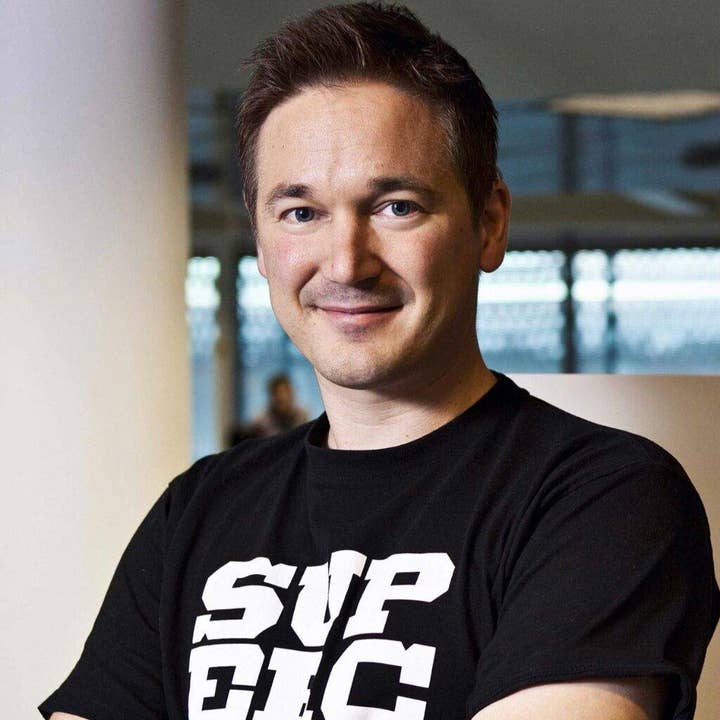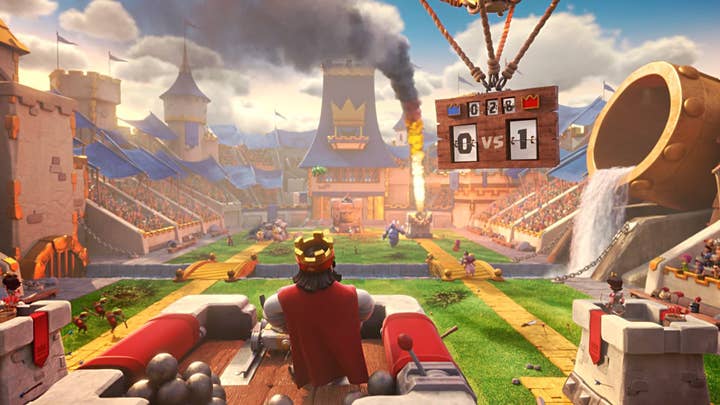Supercell: Meet the industry's "least powerful CEO"
Ilkka Paananen on the value of leaving power in the hands of developers, and Supercell's ambition to create a "truly global" mobile hit
When the GDC audience looks at Ilkka Paananen, they see the leader of one of the industry's most successful companies. When Paananen addresses the crowd, however, he announces himself as, "the industry's least powerful CEO."
It is a striking idea, one at odds with the reason why every seat in GDC's largest room is filled. When the CEO of Supercell takes to the stage, a legion of developers aspiring to emulate its unrivalled track record of success is ready to listen. The abiding message of Paananen's talk, however, cuts against the perception of a CEO as the commanding figure in a company.
At Supercell, he explained, devolving power away from executives is at the very foundation of the company's culture. Individual teams are given near total power to make key decisions, based on the belief that proximity to the product and the audience is the most important factor in making the best choices. As CEO, Paananen doesn't even ask for approval of those choices, regarding it as just another obstacle in the way of effective iteration and execution.
"The best days for me at Supercell are the days where something great has happened and I'm the last one to know about it"
"It has certainly worked for us," he says when we meet after his talk. "We love to work in that kind of environment, but I can totally understand it might not be right for everybody. I think every company should have its own unique way of doing things. You can't just copy a culture from another company."
I point out that many people in the audience will have listened to his talk for exactly that reason: to gain insight into how Supercell built its success, and to emulate the ideas of its leader. For Paananen, though, the most important decision he made as the head of Supercell was to empower people to make decisions of their own, and to be sure to hire only the very best people.
"Ultimately, that's almost the only thing that you can control," he says. "It's such a competitive industry, and it's so hard to predict what's going to happen. You maximise your chances of success by having the best teams possible, and allowing those teams to operate in the best possible environment.
"The best days for me at Supercell are the days where something great has happened and I'm the last one to know about it. That actually happens quite often these days. Those are the moments when I feel that the organisation is working the best."
Indeed, the way Supercell is organised works well enough for the company to have no official human resources department. When problems do arise between members of staff - far from a common occurrence, Paananen assures me - they are expected to be resolved amicably within each team, which rarely have more than seven members unless their project is a live game. Only on the rarest occasions does a team leader even need to mediate.

"All of us five around here," Paananen says, gesturing to the group of people sat around our table. "We could be a game team. This would be a typical Supercell game team. You don't need anyone to facilitate stuff. We can just sit here and work on it.
"It's the sense of ownership, and the sense of responsibility. The [creative] independence is the nice thing to talk about - the fun part - but what's a bit harder about it is this responsibility that you have."
The scale of Supercell's profits and the reach of its games belies the actual size of the company, which still has a headcount below 250 people. This is an order of magnitude smaller than King, one of the few mobile companies that can rival its commercial performance, and a great deal smaller than a dozen companies that don't really come close. According to Paananen, staying small has been absolutely vital to sustaining the culture that produced hit games like Clash of Clans and Clash Royale, but it hasn't been easy. The most common response to huge success is to grow, he says, and it is far easier to give in to that than to resist.
"[Growing] absolutely does make it harder, and not only the larger you get but the more successful you become. There's the temptation to grow and do more. This traditional way of doing things, it tries to creep in. It almost has a gravity that pulls you towards it, and you have to fight back every single day."
"I think the days of fast following somebody, and trying to be a better version, that doesn't make sense. The competition is too tough"
"And it's one thing to talk about this stuff when things are going well, but when things aren't going well? That's the true test of a culture. How much do you really trust your people? There have been a number of times at this kind of crossroads. We had a very strong sense that, if you just think about the short term, the right decision would be to overrule the team. But it would come with a huge price.
"The other path is to let the team do what they want, and they could be right or could be wrong. But even if they're wrong it's best for the long-term, because that enables us to sustain our culture. You can force yourself into that kind of mindset, where you don't just think about next year; you think about the next ten years. It makes it much easier to make that kind of choice."
For the most part, the freedom to make decisions relates to the many game concepts that Supercell's teams are working on at any one time. The exact number fluctuates - Paananen estimates five at the moment, but he happily concedes that he doesn't know for sure and, more to the point, he doesn't need to know. What doesn't change, though, is the standard a game has to reach before being soft-launched, and the even higher standard necessary for a full, global release.
Paananen is clearly uncomfortable with terms like 'failure'. He compares Supercell's teams to scientists testing a hypothesis; it may prove to be false, but that result can be as informative and valuable as any other, and the same is true of the company's approach to development. Ultimately, this leads to a high kill-rate, which can be difficult for developers to accept in an industry where shipping products is a matter of pride and professional standing.

"We've talked about this a lot," he admits. "Nobody likes killing stuff, of course, but the reason people think it's okay is, one, the decision is made by them and not me. And two, if you kill a game because the metrics just aren't there, it's nobody's fault. You made a hypothesis and the result was false. It's not the end of the world, even if it can be painful because you worked so hard.
"But what makes the decision just a bit easier is if you think about the other option: 'This game really didn't reach the metrics but let's release it anyway'. Would that be the right call?
"When you release a game in our business, it's not a fire and forget model. If you get real people playing your game, they invest their time, and many of them invest their money. Then I feel and we feel that we are responsible for those players, and we are responsible for updating that game and making it better every single month. Whenever we release something, it's a huge commitment for the next five or ten years at least.
"Nobody has done a truly global mobile game yet... That's one of our really big dreams. That drives us"
"So the question I ask is: Here's a game that didn't reach your goals - would you, yourself, commit to this for the next five years? All of a sudden you get this better perspective on things."
The gap between Boom Beach and Clash Royale - Supercell's third and fourth games respectively - was two years, and work on new ideas never stopped for a single day of that period. The standard is very high, Paananen admits, but it is no higher than the current mobile market demands.
"It's even more important today to build something that doesn't exist yet," he says. "I think the days of fast following somebody, and trying to be a better version of 'Game X', that doesn't make sense. The competition is too tough, and it is just better for the whole market to try and test different mechanics and different ways of doing things.
"Because of our culture, it really is up to the team. It really goes back to that. And if you think about the biggest hits in the games industry, they tend to be unexpected things. The way to get there is to have really creative people trying out crazy things. And one of these days, they might work."
One of the next frontiers for mobile gaming will be a deeper exploration of social gameplay, an area where developers have "still just scratched the surface" relative to the capabilities of mobile as a platform. This could be the key to what Paananen sees as perhaps the biggest opportunity for a mobile developer to emulate - and even surpass - what Supercell has achieved.
"Nobody has done a truly global mobile game yet, meaning that this game becomes number one in the US and the UK, but also in China and Korea and Japan," he says. "That's one of our really big dreams. That drives us. Could we really create one of the games to get there?
"And the interesting thing is that it can be done. We've been the number one game in Korea, which was completely unheard of. How can a game from a distant country like Finland be number one in a very passionate and competitive gaming market like Korea? And we've been top ten in Japan and also in China. But that's exciting. How do you think even more global?
"The markets do have different tastes, but I think those tastes are getting closer together. It's becoming more and more global."
